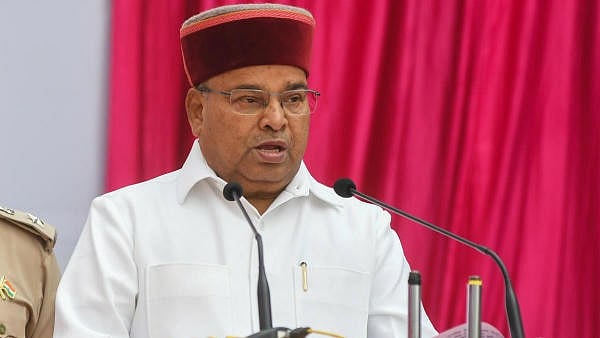
Karnataka Governor Thaawar Chand Gehlot
Credit: DH Photo
Bengaluru: In a setback to the Siddaramaiah administration, Governor Thaawarchand Gehlot cited regulatory excesses while sending back on Friday the much-discussed ordinance to protect borrowers from harassment by micro finance institutions (MFI).
The government, which drafted the ordinance on the back of a spate of suicides and lakhs of complaints by borrowers harassed by MFIs, is keen on getting the ordinance passed. While the Governor's criticism was scathing, Law and Parliamentary Affairs Minister H K Patil articulated his clarifications through an equally strong rejoinder.
The final draft of the ‘Micro Loan and Small Loan (Prevention of Coercive) Ordinance, 2025', prepared by a team of bureaucrats working at the chief minister's behest to resolve the loopholes in the initial draft, mandated a maximum punishment of 10 years' imprisonment and a maximum fine of Rs 5 lakh for MFIs or money lending agencies using coercive action for money recovery.
Objecting to the "excessive" punishment and fine, Gehlot said: "When the maximum loan these MFIs can lend is itself Rs 3 lakh, levying a fine of Rs 5 lakh is against natural justice. Compared to provisions available for such offences in other laws, the quantum of punishment seems disproportionate."
Responding to this, the law minister explained that the quantum of fine or punishment was not related to the loan amount. "The fine and punishment have been imposed based on the coercion, torture and pressure exerted while trying to collect loans. Thus, the ordinance in no way goes against the principles of natural justice."
Patil explained that the government intended to quantify the offences during illegal money collection and fixing punishment.
'Ordinance will affect poor'
In a strongly worded objection, the Governor noted that a simple reading of the ordinance was "against" the loan rules that government banks depend on.
"Self-help groups play a major role in uplifting the lives of the socially underprivileged. This ordinance has a detrimental effect on the business potential of these SHGs. It may even be a violation of fundamental rights under article 19 of the Constitution."
In response, Patil stated that the ordinance would have no impact on the business of SHGs.
While Gehlot took exception to the clause that unregistered and unlicensed MFIs will not be allowed to collect loans, Patil retorted that unlicensed MFIs were not eligible to collect loans, simple or compound interests.